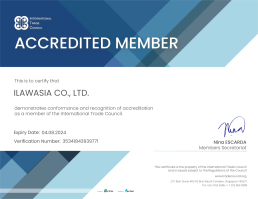Introduction of Our Japan Desk
In May 2023, ILAWASIA Co., Ltd. launched new practice group namely Japan Desk, which aims to provide comprehensive support and provide legal services to Japanese businesses and individuals.
Leading our Japan Desk are Somphob Rodboon, Managing Partner, and Gensei Ohama (大濵 巌生), a highly experienced attorney-at-law. With his extensive knowledge of Japanese business practices and legal expertise, Gensei is dedicated to delivering tailored solutions and support to our esteemed Japanese clients. Together, they bring an extensive experience and expertise in various legal practice areas, with a particular focus on the Japanese market. Our team’s depth of experience allows us to better understand the unique needs and challenges faced by our Japanese clients across different legal issues. We are committed to providing comprehensive support and legal services to Japanese companies operating in our jurisdiction, as well as foreign companies seeking to enter the Japanese market.
In addition to our legal expertise, we offer fluent English and Japanese language capabilities within our team, enabling us to communicate effectively with our Japanese clients, ensuring seamless collaboration and understanding throughout the legal process.
We are actively seeking to broaden our client base and establish long-term relationships with Japanese individuals, businesses, and law firms and we are eager to provide valuable legal guidance and support tailored to client’s specific requirements.
Service Focused:
• Corporate and Commercial
• Intellectual Property
• Litigation and Arbitration
• Investigation and Compliance
• Fraud and Corruption
• Labour Laws
• Breach of Contract
We look forward to working with you and appreciate the opportunity to be of service. Please feel free to contact us at japandesk@ilawasia.com
Engage for more about our Japan Desk at this link : https://ilawasia.com/wp-content/uploads/2023/11/JapanDeskBrochure_Horizontal-Current-3-1.jpg
ILAW LAOS ranked as Notable firm.

LAWASIA’s branch office in Lao PDR, named as ILAW LAOS, was chosen as Notable firm in the General Business Law practice area to the asialaw 2023 rankings, a legal directory featuring comprehensive analysis on Asia’s regional and domestic firms.
This recognition is first time of the ILAWASIA ranked in the asialaw directory for Laos jurisdiction.
ILAW LAOS was established since January 2021 and continued to be your services in corporate and commercial, as well as intellectual property.
For more details and to browse the full rankings, please visit https://www.asialaw.com/Jurisdiction/Laos/Rankings/341#rankings
Attorney Kanyamol has been recognized as ALB Thailand Rising Stars 2023.

We are delighted to share that Ms. Kanyamol Phupapeiw, Senior Litigation Associate of ILAWASIA Co., Ltd., has been recognized by Thomson Reuters’ Asian Legal Business (ALB) as one of Thailand Rising Star 2023 and published in Asian Legal Business Journal, September 2023 edition, page 28.
This recognition highlighted Thailand’s 30 lawyers who delivered exceptional performance and was chosen based on their significant deals and cases, as well as favorable compliments from key clients.
Kanyamol Phupapeiw is one of 30 Thai Rising Stars recognized this year, with a practice focus on litigation and arbitration. For nearly a decade, her expertise and experience have been instrumental in the development of ILAWASIA’s litigation department.
Many congratulations to Kanyamol for this well-deserved honor!
Follow this link for more of the Thailand Rising Stars coverage in the September 2023 issue of ALB: https://www.legalbusinessonline.com/sites/default/files/e-magazines/ALB-SEPTEMBER-2023-(ASIA-EDITION)/28/
ILAWASIA is recognized firm in tier 2 of Asia IP Patent Contentious Survey 2023 for second terms.

Based on feedback and research received from corporate counsel, IP owners, brand portfolio managers in the global and regional IP community.
We are honored to announce that ILAWASIA has received Tier 2 recognition for Patent Contentious, conducted by AsiaIP Patent Survey of 2023 and this recognition is consecutive terms since 2022.
ILAWASIA has previously been awarded by AsiaIP in the Trademark Survey Rankings 2023 and Copyright Survey Rankings 2023.
Throughout the years, ILAWASIA has advised some of our clients to obtain all the benefits of their patent assets including design patents, utility model, and invention patents.
Customs Regulation for protection of trademark rights
In Brief
Myanmar’s Ministry of Planning and Finance issued the Notification No. 50/2023 relating to the Customs Regulation for Protection of Trademark Rights on 14 July 2023.
The Customs Regulation set out the procedure of the recording and suspension of importing the counterfeit goods into the Union to protect the trademark rights.
Key Takeways
A. Application for recording
An applicant or its representative may apply the recordation to the Director General of Customs Department by filing out the general information on right holders, personal data of applicants and company profile of applicant with the form-1.
Detailed of suspected goods for applying recordation to be required in the form as follows;
| Details | Required documents |
|---|---|
| ♦ Product Name | ♦ Trademark registration certificate (copy) |
| ♦ Description of goods | ♦ Supporting materials/tools and detailed description of goods to make them recognizable |
| ♦ Harmonized System (H.S Code) | ♦ Power of attorney |
| ♦ Registration No. at Myanmar IP Department | ♦ Public announcement |
| ♦ Registration date at Myanmar IP Department | ♦ Other necessary documents |
| ♦ Duration of the right |
If the application is complete and accurate, the Director General will provide a registration number and inform the result in Form-2 within 15 days from the date of acceptance the application. If the application is incomplete or inaccurate, the Director General will inform the result in Form-3 within 7 days from the date of acceptance the application.
The term of recordation is 2 years from the date of acceptance. The extension can be applied with Form-4 within 30 days before end of the two-year term.
If there are any changes on registered mark at Myanmar Intellectual Property Department (MIPD), the applicant shall inform to Customs Department within 3 working days from such changes.
B. Suspension order
An applicant may apply for a suspension order to the Director General of Customs Department by filing out general information of right holders, personal data of applicants and company profile of applicant with Form-5. If there is sufficient evidence that the goods affixed with the counterfeit mark, customs officer will suspend the importing of goods into the local.
Detailed description of suspected goods for applying suspension order to be required in the form as follows;
| Details | Required documents |
|---|---|
| ♦ Trademark Right | ♦ Trademark registration certificate (copy) |
| ♦ Description of the goods | ♦ Prima facie evidence of infringement |
| ♦ Harmonized System (H.S Code) | ♦ Supporting materials/tools and detailed description of goods to make them recognizable |
| ♦ Registration No. at Myanmar IP Department | ♦ Power of attorney |
| ♦ Registration date at Myanmar IP Department | ♦ Public announcement |
| ♦ Duration of the right | ♦ Other necessary documents |
| ♦ The reason of application for suspension of release | |
| ♦ Importer of the suspected goods for suspension | |
| ♦ Exporter of the suspected goods for suspension |
If the application is complete and accurate, the Director General will inform in Form-6 within 15 days from the date of acceptance the application. If the application is incomplete or inaccurate, the Director General will inform the result in Form-7 within 15 days from the date of acceptance the application.
The applicant shall pay a security deposit with the Customs Department within 5 working days from the notice of the acceptance of the application for the suspension order.
In the case of applying for a suspension order, the applicant and the importer must be informed of the acceptance of the issuance of the suspension order in Form-8.
If the importer is not satisfied with the suspension order, he may apply to the relevant Myanmar Intellectual Property Court to amend or revoke the suspension period and inform to the Director General of Customs Department within 15 days from the date of notification of the suspension order.
Miscellaneous
- The following imported goods shall not be subject to the requirements of Customs Regulation;
- De-minimis goods
- Transshipment cargo
- Reshipment cargo
- Retention cargo
- Transit trade cargo
- Goods that are permitted to be imported by the government for public benefit or an emergency situation.
3rd terms of accomplishment as AsiaIP’s Expert in Thailand.

Success is never-ending. This year is the third term of success for Somphob Rodboon, a Managing Partner of ILAWASIA CO., LTD., to be one of the 50 remarkable AsiaIP’s Experts in Thailand for year 2023, acclaimed by Asia IP publishing. He has continuously led the firm’s accelerated growth in intellectual property in prosecution and contentious matters.
The list profiles leading IP lawyers in Thailand following extensive interviews with corporate counsel, and with significant feedback from IP practitioners.
Accredited member to International Trade Council

ILAWASIA Co., Ltd. has been ceritified as accredited member to International Trade Council.
The International Trade Council (ITC) is synonymous with bringing together global professionals across a broad spectrum of industries.
Revocation of Notarized POAs for any IP-related matters in Lao PDR
In Brief
On June 26, 2023 the Department of Intellectual Property, Ministry of Industry and Commerce, issued a Notice of revocation the attachment of notarization for certifying the original power of attorney.
Key Takeaways
The Department of Intellectual Property (DIP) has informed that the notarization of attachment that was used to authenticate the initial power of attorney has been revoked as the DIP intends to facilitate and enhance the procedures on the submission of the application and required documents for registration. It also includes the filling of additional documents that are original and no longer requires a notarization for the power of attorney as following details:
Power of Attorney
Deed of Inventorship
Assignment
Licensing
Declaration of Change of Name and/or Address
The representative companies that require for submission of the original power of attorney must apply the regulation or law concerning the power of attorney and must be responsible for the authenticity power of attorney. The DIP will inquire or verify based on a case-by-case basis, if there are any suspicions.
Conclusion
As the new notice of revocation the attachment of notarization for certifying the original power of attorney, has been announced. The original versions of the accompanying documents mentioned above are no longer necessary for notarization.
However, the Applicant required to submit the original of POA to accompanying the registration.
This notice takes effect from June 26, 2023 onwards. We would like to inform you for acknowledgement and compliance. Should you need further information on Laos Intellectual Property law, please drop us a line at IP@ilawasia.com
2023 Asia IP Trademark Survey Rankings

We are honored to have been ranked Tier 2 in Trademark Contentious area of the Asia IP Trademark Survey Rankings 2023 in Thailand jurisdiction.
This ranking is based on feedback and recommendations from corporate counsel, intellectual property owners, and brand portfolio managers from around the region and the world, as well as submissions from law firms in the global/regional IP community.
ILAWASIA also handled all aspects of trademark portfolio management and trademark strategic consulting, including advice and handling trademark searches, trademark applications, and trademark prosecution in numerous countries around the global.
Furthermore, AsiaIP previously recognized ILAWASIA as Tier 2 in the Copyright Survey Rankings for 2022-2023, as well as Tier 2 in the Patent Contentious Rankings for 2022.
Announcement to New Myanmar Companies’ Registration
The Directorate of Investment and Company Administration (DICA) intends the companies to make a habit of complying with Myanmar Laws and in accordance with the legal requirements when conducting the business in Myanmar.
In order to verify whether the companies, directors and participants comply with relevant applicable laws and to support anti-money laundering and anti-terrorism financing procedures, according to section 97 of Myanmar Companies Law, a company must submit the following information when submitting the Annual Return that it is required to submit within two months after company incorporation.
| No. | Details |
|---|---|
| 1. | A bank account must be opened in the company’s name and evidence that the paid-up capital has been credited to the bank lists as shown in the Myanmar Companies Online (MyCo system). |
| 2. |
The Annual Return is required personal information of an individual who act as a director of the company.
|
| 3. | Recommendation from the relevant township police that the registered office address of the company mentioned in the MyCo system is actually located on the ground and the company is planning to open an office. |
| Remark (i) If a shareholder listed in the company’s registration is a natural person, it is required to submit the same evidences as mentioned in paragraph no.2; (ii) If a shareholder listed in the company’s registration is a legal person or legal entity, related company documents must be submitted as the evidence. |
|
Those who register a new company should fully comply with the above-mentioned points from the date of publication of this announcement which is 1st April 2023 and submit the Annual Return to company.dica@mifer.gov.mm.
Thereafter the Registrar will allow the submitting of the Annual Return that have to submit within 2 months after the company incorporation according to Myanmar Companies Law, section 97 and if there is no fully comply in relation to the submission of the Annual Return, further action will be taken according to Myanmar Companies Law, section 430 (d) as stated the register may give notice to the company that it intends to suspend the company’s registration, and such suspension will take effect within 28 days unless the company makes good the default including by the payment of any outstanding fees and prescribed penalties.
According to the above requirements from DICA, this can be concluded as following remark:
- The new investor is required more responsibility and requirements to incorporate a company in Myanmar than previous company registration system;
- The company’s office address must be an actual established address on the ground and the approval of the relevant department must be applied;
- If the director is a foreigner, the process of applying Form-C at the Immigration Department must be completed.
Therefore, the timeframe for the company’s incorporation should take longer than before.
We will certainly keep you apprised of any future developments in its regard. Should you need further information on Myanmar Companies Law, please drop us a line at corporate@ilawasia.com




























































